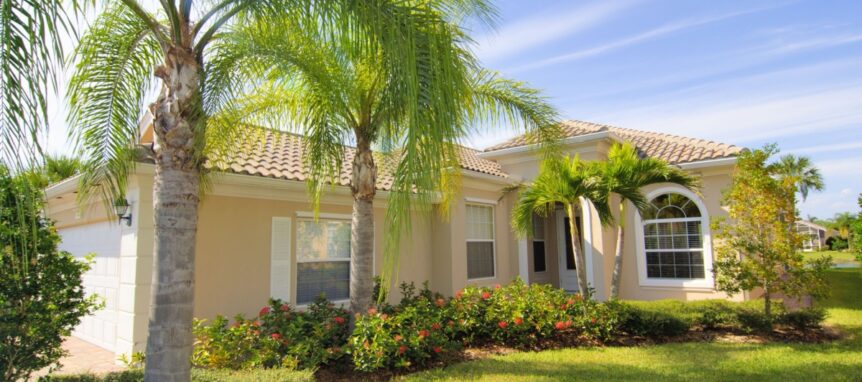Sustainability isn’t just a buzzword—it’s a necessity, especially in regions like South Florida where high temperatures, water usage, and storm activity are shaping the future of residential landscaping. For homeowners associations (HOAs), property managers, and environmentally conscious residents, eco-friendly landscaping offers a smart, responsible way to create beautiful outdoor spaces that protect both the environment and your budget.
By incorporating sustainable practices into your landscape design and maintenance plan, your community can enjoy vibrant greenery, improved air and water quality, and reduced long-term costs—all while preserving the natural beauty of South Florida.
Drought-Tolerant and Native Plant Choices
One of the easiest ways to reduce water consumption and improve landscape resilience is by selecting native and drought-tolerant plants. Florida-native species are already adapted to the region’s unique climate, which means they require less irrigation, are more pest-resistant, and can thrive with minimal maintenance. Plants like firebush, coontie palm, dwarf fakahatchee grass, Simpson’s stopper, and beautyberry not only support local ecosystems by attracting pollinators such as butterflies and bees, but they also hold up better against tropical storms compared to many non-native ornamentals. Additionally, when used as ground cover, these plants help suppress weeds and reduce soil erosion—both of which contribute to a healthier landscape.
Efficient Irrigation Systems
Water conservation is a key component of sustainable landscaping. Outdated or poorly planned irrigation systems can waste thousands of gallons of water each year. Today’s high-efficiency systems, such as drip irrigation, weather-based controllers, and programmable timers, deliver precise amounts of water based on the needs of each zone. Rain sensors and shut-off devices prevent overwatering during wet conditions, and scheduling irrigation in the early morning hours helps minimize water loss due to evaporation. Applying mulch to flower beds and tree bases further retains soil moisture, reducing the frequency of watering. A professionally designed irrigation system tailored to your landscape ensures that every inch is properly nourished without wasting a drop.
Organic Fertilization and Pest Control
Many traditional lawn care products contain synthetic chemicals that can leach into the groundwater or wash into nearby storm drains, affecting the health of rivers, lakes, and coastal waters. Eco-friendly landscaping favors the use of organic fertilizers and soil amendments that release nutrients slowly and naturally, encouraging strong root systems without harmful runoff. When it comes to pest control, integrated pest management (IPM) is the preferred approach. This method emphasizes regular monitoring, preventive care, and the use of targeted treatments only when needed. By minimizing chemical exposure and supporting a balanced ecosystem, IPM keeps landscapes healthy while protecting beneficial insects, birds, and other native species.
Stormwater Management with Permeable Surfaces
In a region like South Florida, where sudden downpours are frequent, proper stormwater management is critical to protecting both property and the environment. Eco-friendly landscapes use permeable surfaces to allow rainwater to soak into the ground rather than running off into streets and storm drains. Permeable pavers, gravel walkways, rain gardens, and bioswales are just a few examples of landscape elements that reduce runoff and naturally filter pollutants. These features also help recharge groundwater and prevent flooding in low-lying areas. Beyond their environmental value, these solutions can add beauty and functionality to community walkways, entryways, and recreational areas.
Regular Maintenance with a Sustainable Mindset
Eco-friendly landscaping doesn’t stop at installation—it continues with thoughtful, ongoing maintenance. Partnering with a service provider who prioritizes sustainable practices ensures your green spaces remain healthy without sacrificing the environment. Using electric or low-emission equipment helps reduce noise and air pollution. Composting clippings and organic waste instead of sending them to the landfill supports nutrient recycling. Adjusting mowing schedules to match seasonal growth helps maintain turf health, and routinely checking irrigation systems for leaks prevents water waste. These small adjustments make a big impact over time and demonstrate a community-wide commitment to sustainable living.
Partner with Legacy Services for Sustainable Solutions
At Legacy Services, we help South Florida communities turn their landscaping goals into sustainable realities. Whether you’re looking to conserve water, enhance native planting, or reduce your property’s environmental impact, our team designs eco-friendly solutions that align with your needs, your aesthetic, and your budget. We’re proud to support communities that care about both curb appeal and conservation.
To learn more about sustainable landscaping for your HOA or residential property, contact us today.

